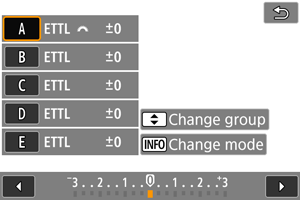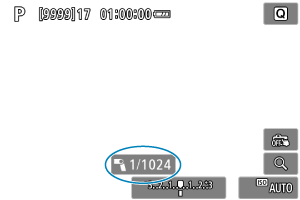Shooting with Speedlites
- EL/EX Series Speedlites for EOS Cameras
- Canon Speedlites Other Than the EL/EX Series
- Non-Canon Flash Units
- Quick Flash Group Control
- FE Memory Function
EL/EX Series Speedlites for EOS Cameras
Features of EL/EX series Speedlites (sold separately) can be used in flash photography with the camera.
For instructions, refer to the EL/EX series Speedlite's Instruction Manual.
Caution
Note
- The Speedlite will fire an intermittent AF-assist beam as needed, if autofocusing is difficult under low light.
- You can also set flash exposure compensation in [External flash func. setting] in [
: Flash control] ().
- The camera can turn on certain Speedlites automatically when the camera is turned on. For details, refer to the instruction manual of Speedlites that support this feature.
Canon Speedlites Other Than the EL/EX Series
-
With an EZ/E/EG/ML/TL series Speedlite set to A-TTL or TTL autoflash mode, the flash can be fired at full output only.
Set the camera's shooting mode to M or Av and adjust the aperture value before shooting.
- When using a Speedlite that has manual flash mode, shoot in manual flash mode.
Non-Canon Flash Units
-
Sync speed
The camera can synchronize with non-Canon compact flash units at up to 1/250 sec. With large studio flash units, the flash duration is longer than that of a compact flash unit and varies depending on the model. Before shooting, confirm that flash sync is performed correctly by taking some test shots at a sync speed of approx. 1/60 sec. to 1/30 sec.
Caution
- Manually lower the built-in flash before attaching an external flash unit.
- Using the camera with a dedicated flash unit or flash accessory for cameras of other manufacturers poses a risk of malfunction and even damage.
- Do not attach a high-voltage flash unit to the camera's multi-function shoe. It may not fire.
Quick Flash Group Control
As you view the shooting screen in wireless multi-flash photography, you can configure the settings for each flash group by pressing the button assigned to [Quick flash group control] in [: Customize buttons]. This example is based on assigning the
button ().
-
Set the flash firing mode to
(individual group control) to prepare for wireless multi-flash photography.
- For details, refer to the instruction manuals of flash units supporting wireless multi-flash photography.
-
During standby, press the
button.

- A setting screen for each flash group is displayed.
- Press the
keys to select a group (A–E) to configure.
- Press the
button to set the flash mode.
- Turn the
dial to adjust flash output or flash exposure compensation.
Note
- You can access the [Quick flash group control] setting screen in P, Tv, Av, or M mode.
- Pressing the
button displays the [External flash func. setting] screen for Speedlites in flash modes other than
(individual group control).
FE Memory Function
You can set the flash output captured in the flash mode ETTL as the flash output for the flash mode M by pressing the button assigned to [ETTL M] in [
: Customize buttons]. This example is based on assigning the
button ().
-
Set the flash Custom Function setting [FE memory] to [2:Enable(
ETTL
M)].
- For the setting procedure with the flash, refer to the instruction manuals of flash units (except the EL-1) supporting FE memory.
-
Shoot with the flash mode set to ETTL.
- Press the shutter button completely to take the picture.
-
During standby, press the
button.

- The flash mode switches to M and the flash output captured in step 2 is displayed.
- When you press the
button again after shooting with the flash mode set to M, the flash mode switches to ETTL and the flash exposure compensation is displayed.
- To change the flash output or the flash exposure compensation, perform operations with the flash or set with [Flash function settings] ().
Note
- The FE memory function is available in Fv, P, Tv, Av, M, and B modes.
- When the flash is set to a flash mode other than ETTL or M, the flash mode will not change even if the
button is pressed.